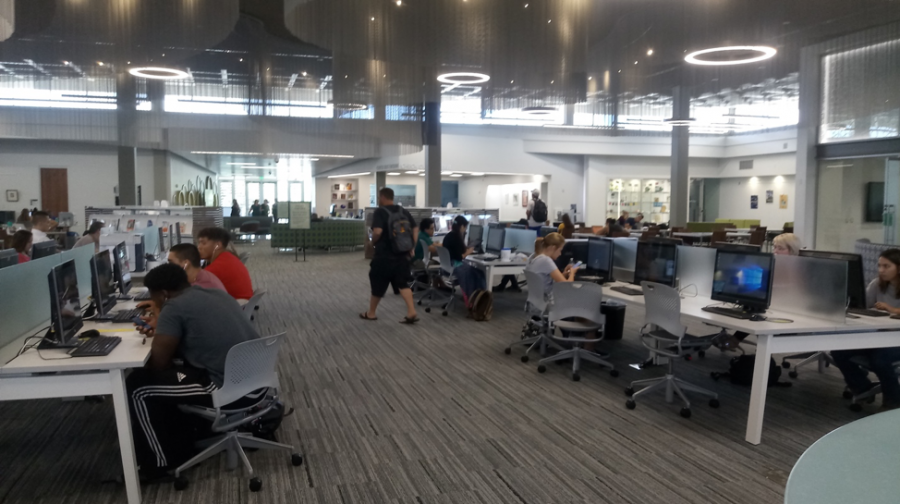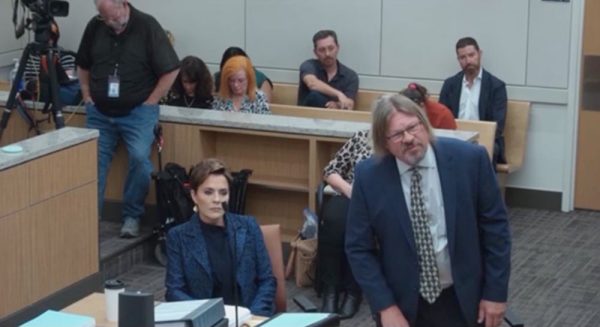8-week, campus wide, time-compressed courses: Unpopular as the majority proposal offering for Scottsdale Community College students and faculty
Students in the computer lab at SCC.
February 16, 2020
The community college system in America has been under increased scrutiny for the past decade—retention and completion rates, the question of whether or not the community college is equipping students for the workplace, performance and access differences between students of higher and lower income— as well as policy from state and federal lawmakers that have effectively crippled the community college’s public aid and financial support.
But the community college, as a whole, presents the most diverse campus America has to offer and provides opportunity for any student that desires to enter higher education, at the entry level, as well as those that wish to return to their education.
Therefore, faculty, administrators, but most of all…the students themselves, should be involved in the evolving conversation about what works…and what doesn’t.
While the community college system has always needed fine tuning along the way, it’s still a system that, frankly, has sustained the greatest option for students— regardless of gender, race, age, religion or income and all within a community setting that embraces and integrates a unique combination of traditional aged college students and adult students entering or re-entering higher education.
Community college, in many ways, is like, ‘real life 101.’
So there is simply no “one size fits all” solution to the above issues and challenges of the nation’s community colleges in the 21st century despite a litany of zealous proposals placed on the table—or worse, put into action without appropriate examination or research of long-term effects.
Campus administrators or district policy makers will likely find that plans to convert a community college system with an extreme proposal that does not have the majority support of those it will affect the most, namely, faculty and students— these kinds of plans will undoubtedly meet resistance.
This past fall/winter Scottsdale Community College faculty were informed about a proposal to take SCC to a majority of class offerings that would follow a predominantly 8-week compressed class format.
“The proposal that we heard, was that by Fall, 2021, that we would move to 80% of our classes being eight week classes, keeping in mind that it may not work for all disciplines,” said Ramona Goth, SCC English faculty and former SCC faculty senate president.
Classes that might not be compatible with the 8-week class offering would need to appeal to administration for exemption from 8-week terms.
Northeast Valley News wanted to know which office the proposal was coming from.
“No, I personally don’t know where it’s coming from,” Goth said.
So far, Northeast Valley News has not been able to pinpoint exactly where this proposal originated for the SCC campus going to an 80%, 8-week course majority—or whether or not the decision to implement the plan by 2021 was a foregone conclusion.
As of publication, several of our questions were still not answered by SCC administrators.
Northeastvalleynews.org was also told last week in the office of SCC Marketing and PR Manager, Eric Sells, that they would not speak to us any further on the proposal but would email a press release to us.
Prior to receiving the press release, SCC Dean of Instruction, Eddie Lamperez, issued a statement to nevalleynews.org and included a PDF attachment that outlined a proposal titled, “SCC Eight Week Schedule Shared Governance Plan”—his emailed statement read:
“SCC is considering moving to a predominantly eight week class schedule within the current academic calendar which would effectively mean that eight week classes or condensed classes would become the norm. Other formats would still be an option including the traditional sixteen week class. The proposed change would provide more options to current and future SCC students. If we were to move forward with the proposal it would mean that the number of condensed classes and late start classes would increase. The discussion is still preliminary and the SCC Strategic Scheduling Committee has put forward the attached outreach/shared governance document to solicit input on the proposed change from the campus community. That is the current status regarding the proposed class schedule changes.”
As of publication, our follow up questions sent to Mr. Lamperez have not been answered, but consisted of inquiries and a request for further explanation of the “shared governance” reference in his statement (input from faculty or if the 8-week plan had been supported by faculty through the shared governance policies)—and lastly, whether key decision makers and advocates for this policy had definitively moved forward with the implementation of the predominantly 8-week course offerings at SCC.
Northeast Valley News respectfully asks again for a response to our follow-up questions.
We asked Goth what she believed were the primary issues with these proposed changes.
Goth told nevalleynews.org that the English department, for example, believes that their discipline is not compatible with an 8-week term because teaching critical thinking takes longer than 8 weeks and it places constraints on what you can teach because students have to be prepared to move into the next section.
“In 101, you have to make sure that students in English 101 are prepared for English 102. In 16 weeks you get a lot of time, but in 8 weeks you have to get it down to the very nuts and bolts. This is it. These are the downbeats and this is what you have to teach and you have to know to get out of there. If we don’t all have the same downbeats, now when you move into English 102, you don’t have skills that you need for English 102. That happens right now in 16 weeks. Students will come into my 102 class and not have the skills I need them to have,” Goth said.
She admitted that there may be other options and that the discussion should continue to take place, but was concerned about a 2021 implementation and a number like 80% of classes going to 8-week schedules was troubling—not only to Goth, but other faculty as well.
Many faculty members feel like it hasn’t been piloted sufficiently and Goth explained that the claims that they are basing decisions on success at Amarillo and Odessa, which are isolated and have embedded support were not realistic.,
“Offering eight week classes, I don’t think is a bad idea, but to do 80% of our classes in that way, seems to be a pretty extreme gamble,” Goth said.
“We have support on our campuses—I mean, we have wonderful learning centers. Are they geared up for this kind of rapid return? I don’t know. Because we haven’t piloted that. To my knowledge, that hasn’t been forecasted yet,” Goth said.
“My personal question is, are students really interested in doing classes this way?”
Goth explained that 8-week 101 and 102—just this past semester— were “no go’s” due to low enrollment. “
She said that it’s Important for students to know that the schedule is structured to take 3 classes one term and 2 the other. But students may overload and then have to drop classes part-way through the term. Holidays make a big difference during certain terms. If using 2 day/week schedule, missing one class is equal to one week in a 16-week schedule.
“I’m really concerned about students who pay for classes that they wind up dropping,” Goth said.
“I do want to go on record as saying, if anybody’s division, if you, as curriculum specialist, feel that you can do as good a job teaching a class in eight weeks as you can in sixteen weeks – I say ‘go for it’. I think that’s absolutely stellar,” Goth said.
But Goth was quick to add that she does not feel that Amarillo and Odessa Colleges are comparable to SCC.
She taught ENG 102 as an 8-week in classroom and hybrid and said students didn’t want to take it and dropped at a high rate.
“Since faculty doesn’t have data, it would rely on their personal experience with 8-week term scheduling.’
She feels that SCC administration will be fair and will want to do the right thing but when changes are being made so quickly it will be difficult to tell what’s working.
“Is there any data? Are we comparing apples to apples? Do students want it or understand it?”
An 8-week class is like scanning a chapter—16 weeks is in-depth
We asked Goth, if she were in charge, how would she proceed?
“Trust the divisions to make the decisions, but if 8-week classes are offered, ensure that the quality of education is foremost,” Goth said.
“Create scheduling focus groups, begin with some 8-week classes and study results.”
Exemption rates might be more flexible than initially understood
‘Insufficient long-term data on time-compressed courses to be considered successful’
A 10-year Scottsdale Community College faculty member who spoke on the condition of anonymity for fear of retaliation told nevalleynews.org—that faculty can easily find data that does not support the long term success of 8-week course offerings and the move to what amounts to an ‘overnight’ conversion of the Scottsdale campus is more than troubling—and there’s simply ‘insufficient long-term data on time-compressed courses to be considered successful’
The faculty member also referred to growing data and troubling results of online education.
A 2019 article by Forbes suggests that online (or distance courses) that rely on high self-discipline where students are expected to engage in extensive reading with no classroom instruction and communication are failing at a high rate. The Forbes article states:
“Starting with a baseline of what we know about distance education,” Clare McCann, the deputy director for higher education policy at New America and former senior policy advisor for the U.S. Department of Education (told Forbes), “is that it does not work all that well – particularly for disadvantaged populations, those unprepared for college, first-time students and those struggling to balance learning and life.”
At community colleges, where those populations are heavily represented, nearly 60% of the school leaders responsible for online courses told a recent survey that their students performed worse in online classes than in on-the-ground ones. Less than 5% of program leaders at community colleges said students did better in online programs.
“There are plenty of advocates that still believe online education was the ‘magic pill’ for community colleges. Well, it wasn’t. And neither are 8-week time-compressed courses. They may be a choice—but that’s it— a choice, and not a particularly great choice in the long run for our students. The thought of dismantling a vibrant campus (not to mention the classroom environment) in favor of a compressed 8-week course campus where centers for learning, library facilities, clubs, student organizations and student mentoring is effectively ‘put out of business’ —is a terrible idea.”
“What would happen to our sports programs?”
Several other faculty members approached Northeast Valley News in January and on the condition of anonymity told us that they do not favor a 80% plan to make SCC an 8-week course campus. A main concern was the lack of input from faculty before the transformation decision was made about moving this to completion in 2021.
The ongoing issue of excluding faculty from proposals—before they go to blueprint— is a problem according to these faculty members —not only at the district level, but at Scottsdale Community College.
Northeast Valley News spoke to Scottsdale Community College students.
For the past several weeks nevalleynews.org has placed reporters across the SCC campus to find out what students think about a campus comprised mainly of 8-week, time-compressed course offerings.
SCC students speak out about campus wide, time-compressed 8-week courses as majority offering
Lina Ellis—“Yeah I mean, I would be really sad if the classes were all changed to eight weeks because then they wouldn’t have an option—but i think having an option might be pretty cool like people who aren’t working and are like right out of high school just want to finish so they could cruise through it really fast but there are also people who are working and they would do better with the sixteen weeks— i think having option would be cool.“
Alex Keeler—“I’m not really in that big of a hurry so I’m good with the way it is”
Jordan Miller—“I actually enjoy the three months (semester)- I enjoy being able to take my time, be able to meet with my professors as needed there’s not as much crunch time so, that’s why I don’t take my summer courses, it’s too stressful.”
Madison Rutherford—“Dude we just talked about this. I am so against it. I am not like a self-motivated person and I know that like if we were to change to eight weeks instead of 16 weeks I’d have to take the partially online classes and I’m not good at motivating myself and I also have to work outside of school so if I had to take a class four days a week instead of the two days that I’m taking now I wouldn’t be able to work so I wouldn’t be able to like do things that I need to do, plus like I feel like an eight week class you’re not going to have as good of a student/teacher relationship and I think that’s like one of the most important things about coming to school cause I like having a teacher telling me things and like actually teaching me instead of just like reading online and doing stuff like that so, and I know that everybody that was just in my last class agrees with me, like there was not anybody in that class who was like ,“yeah I want the eight weeks.”
Savannah Vincent— “ I am fresh out of high school coming here and like I’m trying to get my Associates, my Bachelors, my Masters at some point and like that’s going to take a really long time, so if there is a way to like shorten that while still getting all the work done I’d definitely do it.”
Madeline Hogue—“I think there should always be an option, because personally I would rather take less classes but at a faster pace, and then be able to focus on one or two subjects at a time. But I don’t think that it would be smart for all students to be taking twelve hour credits if they’re going to be taking them in just eight weeks. So for a school to do only classes in eight-week increments is a bit extreme probably. I don’t think people are gonna absorb the amount of information they need to for passing a program.”
Jamal Brown— (Criminal justice student)-“Yeah, I would still rather fit all of my work into twelve period and sixteen definitely simply just because I don’t know I can prepare myself and I’d rather like cram it in and get it done then rather than like having lingering around for period of time when I am always constantly haven’t check back for classes for 16 weeks when I gotta for 12 weeks, it’s just not have that work ethic not at all not everyone have the same work ethic also.
Le Com Sci —(Cyber Security)-“My answer is no, because it affects student veterans. Some student veterans use sort of credit amount to get paid by the VA fully, if not they are gonna reduction to pay. You know the VA will pay their tuition no matters the most of the events their amount of their credit hours and also their amount of the on tax pay on the VA to survive to live properly, so if anything happens to class mid semester to full semester if the VA serviced and it serviced it by the VA and the classes got cancel for some reasons that students is I don’t know they have to scram to find that class within that credit hour.”
Layla Genene—“I like the 16 weeks term because you know I have other things beside school to consider, still work.
Jason Hernandez—I feel like it’s, it’s for some people because sometimes it’s difficult to be here all sixteen weeks.
Tori Woodward (Business)—I would not like, I would not want that definitely, I would rather the 16-week term.”
Kemberly Washington— “If it means that I would get my degree in half the time, yeah.”
Jacob Hernanskey—“I like the 16 weeks. It gives you more time to learn the stuff and it’s just the current like going for four years to school isn’t much. So making it faster won’t change anything I don’t think.”
Desiree Compton—“I don’t do as good online it was a lot of work, so I like the classroom still. I tried online and I failed one and dropped a class. I guess if going for eight weeks, it was for a class that like goes for that kind of schedule, ok, but I like class.”
Kourtnee Begaye – (women’s basketball student athlete) – “No, I like how it is now.”
Elle Baker – (women’s basketball student athlete)-“If I wasn’t a student athlete I would say yes, but having practice on top of school work is already kinda stressful enough, so I would say no.”
Marissa Brantley – (women’s basketball student athlete) – “No sir! Yah – Definitely not.”
Alana Hacket—(nursing student) -I think there are pros and cons to both. I’ve taken a few 8-week courses and i enjoyed them just because I felt like I got more stuff done in a short amount of time but I also like 12 weeks because then you’re not as stressed out, and there’s not as much stuff and it’s spread out.
Daveed Markham—“I wouldn’t, ‘cuz I’m that type of person that kinda like, to like, space my stuff out, kinda like have a set plan on like how the syllabus is going and take my time on like the work. Rather than being so frustrated and so clustered on like doing all the work, all the class assignments and being in the classroom for so long.”
Lexi Lee—“Yes, because graduating early means you can get a full-time job earlier and I would just be better for your career.”
Michelle— (asked not to use last name, nursing student) — “Ok, so I’m not really smart so I take a long time to learn stuff. I feel like a lot of kids are like that too so hopefully it’s better if there’s a longer period.”
Tristan Jones – “I still wouldn’t do it (if I could finish early). I don’t think I would get the same amount of experience.”
Kyle Lamen—“ I’ve taken a lot of classes and in a lot of different types of formats an 8-week course is not something I’ve done but I can see the benefit of it if you can comprehend that amount of information in that amount of time. So if you’re dedicated to that type of course you know, style—that’s really fast— but I can see how someone can do it if that’s what they are trying to do to get their education even faster
Shelby Heave—(nursing student)- I would say that I’d prefers having a full-length term rather than 8 weeks, just simply because it can be especially heavy science classes or like nursing classes, I couldn’t imagine having to deal with that much information in such a short time period.
Northeast Valley News will continue to ask Scottsdale Community College students and faculty how they feel about the majority of courses on campus becoming 8-week time compressed offerings.
Update:—Meeting on this proposal
The academic affairs administration and SCC Interim President, Haines, will be at the faculty senate meeting this Tuesday Feb. 18, in the Red Mountain room in the Indigenous Cultural Center, (ICC 222) at 3:00 p.m. to discuss the proposal to move to a majority of 8-week schedule courses. Any faculty member is welcome to attend the meeting.












